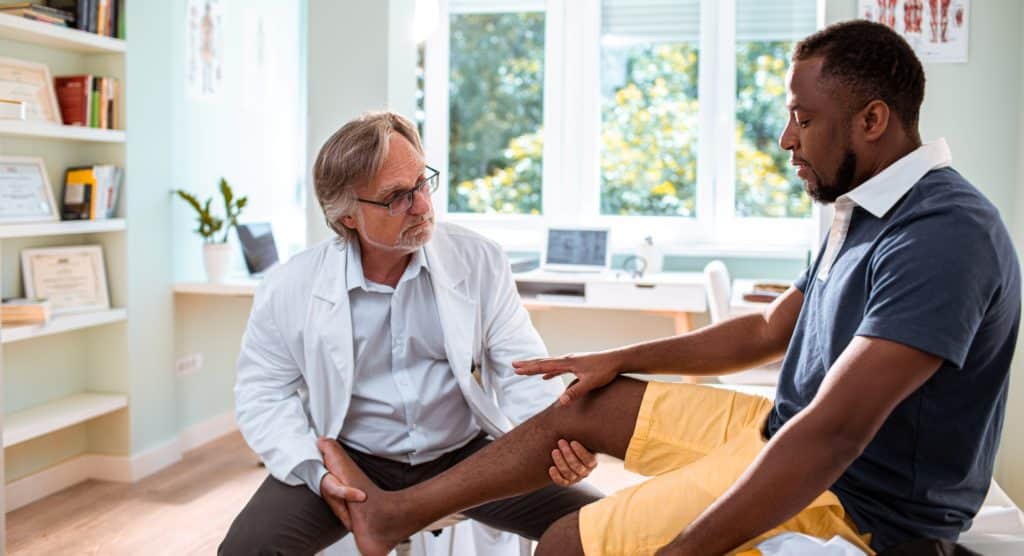

Causes of Radicular Pain
Learn about the causes of radicular pain and what treatment options are available.
Table of Contents
Reach Out to Learn More
Pain Management
If you’re experiencing pain that seems to radiate down your arm or leg, you may be suffering from radicular pain. This type of pain can be caused by various factors, including a herniated disc, stenosis, or spondylolisthesis. It’s essential to understand the root of your problem and seek treatment accordingly to get relief. Here we will explore some of the most common causes of radicular pain and offer ways to find relief.
What Is Radicular Pain?
What Does Radicular Pain Feel Like?
How Long Can Radicular Pain Last?
Symptoms can be labeled as mild, moderate, or severe radicular pain. In mild cases of radicular pain, the symptoms will usually resolve within approximately six weeks. Suppose an individual still reports radicular complaints after six weeks of moderate activity and over-the-counter pain management. In that case, it is essential to speak with a healthcare provider for further recommendations.3
The Effects of Radicular Pain
What Causes Radicular Pain?
Common causes of radicular pain include a herniated disc, foraminal stenosis, diabetes, nerve root injuries, and scar tissue from spinal surgery. The following sections will explore each of these causes.
Herniated Disc
Foraminal Stenosis
Diabetes
Nerve Root Injuries
Healthcare providers investigating radicular pain will often use MRI or CT scans to check for nerve root injuries. Compression and damage of the nerve roots can occur at any disc level within the spine. Nerve root disorders or injuries can result from accidents or other health conditions.
Scar Tissue from Spinal Surgery
What Is Radiculopathy?

Contrary to popular belief, radiculopathy and radicular pain in the arm isn’t the same thing. How do we differentiate between radicular pain vs. radiculopathy? Well, these conditions can occur at the same time, but radiculopathy doesn’t always involve pain. Radicular pain in the arm can be a symptom of radiculopathy or happen alone. In contrast, radiculopathy is described as pain, numbness, and motor loss. Therefore, it’s essential to distinguish between radicular pain and radiculopathy when discussing these conditions.
Risk Factors for Developing Radiculopathy
The following sections will explore the risk factors of radicular pain in the arm and radiculopathy.
Degenerative Disc Disease
Bone Spurs
Tumors of The Spine
Osteoarthritis or Spinal Arthritis
Compression Fractures
A vertebrae compression fracture can result in nerve root injury, damaged back pain dermatomes, and an increase in the likelihood of radiculopathy.
How Do Doctors Treat Radicular Pain?
Radicular pain in the arm, damaged back pain, dermatomes, and nerve pain in both arms can be treated in various ways. The following sections will explore the most common treatment methods for radicular pain in the arm and the disease of a nerve root.
Physical Therapy to Help Strengthen Muscles or Joints
Studies have shown little difference in results between recommended bed rest and physical therapy individuals. Medical professionals typically only recommend physical therapy for individuals whose symptoms have lasted longer than three weeks.
Over-The-Counter Medicines, Such as Acetaminophen or Ibuprofen
Management of radiculopathy arm pain can include conservative medication interventions such as acetaminophen, nonsteroidal anti-inflammatories, and ibuprofen.
Epidural Injections
Medical providers sometimes target back pain dermatomes with epidural steroid injections for patients diagnosed with acute lumbar radiculopathy. This intervention can be beneficial for up to three months.
Alternative Therapies, Such as Acupuncture and Yoga
Scar Tissue from Spinal Surgery
Scar tissue from spinal surgery can increase the chances a person will experience radicular pain. If your doctor believes this issue is causing your radicular pain, they will develop an individualized treatment plan.
Find Treatment for Radicular Pain at J. Flowers Health Institute
Programs at J. Flowers Health Institute
Resources
- https://pubmed.ncbi.nlm.nih.gov/15253601/
- https://www.sciencedirect.com/topics/medicine-and-dentistry/radicular-pain
- https://www.ncbi.nlm.nih.gov/books/NBK546593/
- https://www.aanem.org/Patients/Muscle-and-Nerve-Disorders/Lumbar-Radiculopathy
- https://www.ncbi.nlm.nih.gov/pmc/articles/PMC6615450/
- https://academic.oup.com/rheumatology/article-abstract/17/3/195/1780673?redirectedFrom=PDF
- https://pubmed.ncbi.nlm.nih.gov/21968590/
- https://www.ncbi.nlm.nih.gov/books/NBK448134/
- https://www.aafp.org/afp/2010/0101/p33.html
- https://www.ncbi.nlm.nih.gov/books/NBK553190/
- https://www.ncbi.nlm.nih.gov/pmc/articles/PMC6890346/





